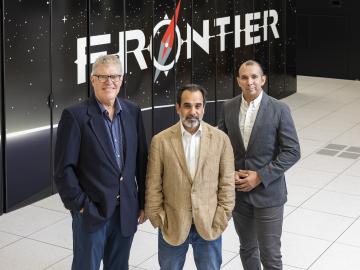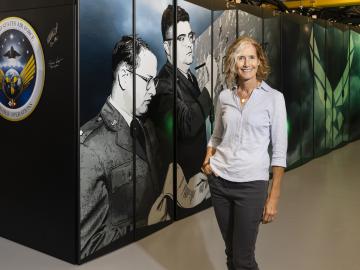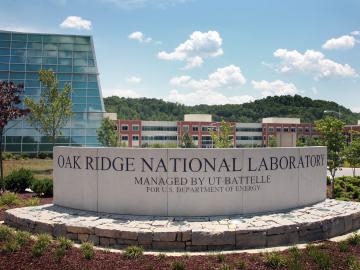
Filter News
Area of Research
- Advanced Manufacturing (2)
- Biology and Environment (12)
- Computational Engineering (1)
- Computer Science (2)
- Electricity and Smart Grid (1)
- Energy Science (16)
- Functional Materials for Energy (1)
- Fusion and Fission (1)
- Isotope Development and Production (1)
- Isotopes (2)
- Materials (12)
- Materials for Computing (3)
- National Security (14)
- Neutron Science (10)
- Nuclear Science and Technology (4)
- Quantum information Science (1)
- Supercomputing (40)
News Type
News Topics
- (-) Biomedical (21)
- (-) Clean Water (2)
- (-) Cybersecurity (18)
- (-) High-Performance Computing (46)
- (-) Machine Learning (17)
- (-) Space Exploration (3)
- (-) Summit (24)
- 3-D Printing/Advanced Manufacturing (59)
- Advanced Reactors (14)
- Artificial Intelligence (46)
- Big Data (17)
- Bioenergy (29)
- Biology (30)
- Biotechnology (12)
- Buildings (22)
- Chemical Sciences (44)
- Composites (14)
- Computer Science (79)
- Coronavirus (17)
- Critical Materials (11)
- Education (3)
- Element Discovery (1)
- Emergency (1)
- Energy Storage (48)
- Environment (51)
- Exascale Computing (23)
- Fossil Energy (1)
- Frontier (24)
- Fusion (19)
- Grid (21)
- Irradiation (1)
- Isotopes (24)
- ITER (3)
- Materials (71)
- Materials Science (60)
- Mercury (2)
- Microelectronics (1)
- Microscopy (20)
- Molten Salt (3)
- Nanotechnology (32)
- National Security (23)
- Neutron Science (61)
- Nuclear Energy (36)
- Partnerships (34)
- Physics (27)
- Polymers (14)
- Quantum Computing (16)
- Quantum Science (35)
- Security (12)
- Simulation (15)
- Software (1)
- Statistics (1)
- Transportation (37)
Media Contacts

Two papers led by researchers from ORNL received “Editor’s Choice” awards from the journal Future Generation Computer Systems. Both papers explored the possibilities of integrating quantum computing with high performance computing.

Researchers led by the University of Melbourne, Australia, have been nominated for the Association for Computing Machinery’s 2024 Gordon Bell Prize in supercomputing for conducting a quantum molecular dynamics simulation 1,000 times greater in size and speed than any previous simulation of its kind.

A team led by scientists at ORNL identified and demonstrated a method to process a plant-based material called nanocellulose that reduced energy needs by a whopping 21%, using simulations on the lab’s supercomputers and follow-on analysis.

A study by more than a dozen scientists at the Department of Energy’s Oak Ridge National Laboratory examines potential strategies to integrate quantum computing with the world’s most powerful supercomputing systems in the pursuit of science.
The contract will be awarded to develop the newest high-performance computing system at the Oak Ridge Leadership Computing Facility.

To better predict long-term flooding risk, scientists at the Department of Energy’s Oak Ridge National Laboratory developed a 3D modeling framework that captures the complex dynamics of water as it flows across the landscape. The framework seeks to provide valuable insights into which communities are most vulnerable as the climate changes, and was developed for a project that’s assessing climate risk and mitigation pathways for an urban area along the Southeast Texas coast.

Scientists at ORNL completed a study of how well vegetation survived extreme heat events in both urban and rural communities across the country in recent years. The analysis informs pathways for climate mitigation, including ways to reduce the effect of urban heat islands.

Kate Evans, director for the Computational Sciences and Engineering Division at ORNL, has been awarded the 2024 Society for Industrial and Applied Mathematicians Activity Group on Mathematics of Planet Earth Prize.

Two different teams that included Oak Ridge National Laboratory employees were honored Feb. 20 with Secretary’s Honor Achievement Awards from the Department of Energy. This is DOE's highest form of employee recognition.

Gina Tourassi, associate laboratory director for computing and computational sciences at the US Department of Energy’s (DOE’s) Oak Ridge National Laboratory, has been named a fellow of the Institute of Electrical and Electronics Engineers, the world’s largest organization for technical professionals.


